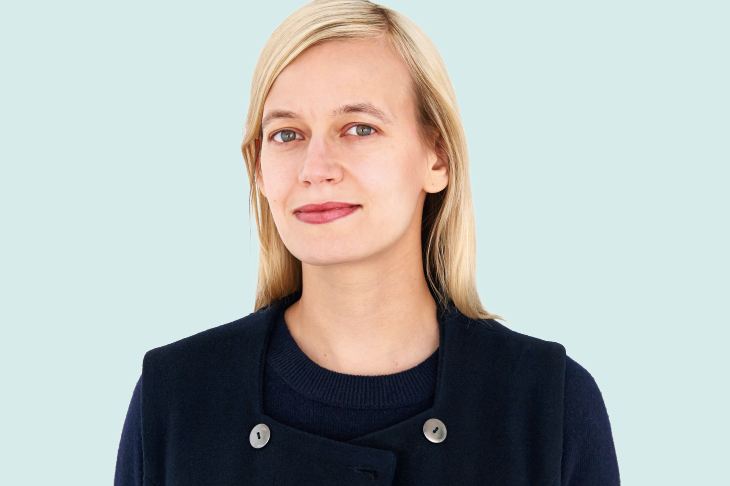39 | Chief Curator, Hessel Museum and Director of the Graduate Program, CCS Bard, New York, USA
Lauren Cornell, the recently appointed chief curator at the Hessel Museum, New York, is among the most influential of those critics, historians and curators working to frame emerging art within broader social and political contexts. The Hessel Museum is part of the Center for Curatorial Studies at Bard College (CCS Bard), where Cornell is also director of the prestigious graduate programme. The dual role is fitting for an individual whose career has been characterised by a disregard for disciplinary boundaries.
Cornell’s early passion for avant-garde film and experimental video – she ran a small cinema space in Brooklyn in the first years of the century – might explain her sharp eye for the latest trends in moving image and what is broadly termed ‘media art’. That increasingly unwieldy phrase encompasses art created using new technologies such as digital animation, virtual realities, internet art, gaming, robotics, 3D printing and a proliferation of other subsets, and much of Cornell’s achievement has been to establish common ground between these and other strands of contemporary art. Allied to the conviction that art should assume a critical distance from the dominant social structures, this has resulted in a series of exhibitions and projects that have helped to re-evaluate what art might look like in the 21st century.
In 2005 Cornell joined Rhizome, the New York-based arts organisation affiliated to the New Museum and dedicated to the promotion of media art. Before stepping down as its director in 2012, Cornell promoted discussion around art and the internet that was rigorous and accessible, excited by the transformative possibilities of the web without ever succumbing to blind utopianism. At a time when optimism over the positive applications of new technologies risks being overwhelmed by public anxieties over surveillance, fake news and state hacking, the importance of such even-handed and scholarly research into the implications of online culture becomes clearer than ever. Cornell’s Mass Effect (co-edited with Ed Halter), which explores the transformation of the internet from a new medium into a mass medium in the 2000s, is already a standard point of reference for critics and curators.
These preoccupations would help to shape Cornell’s curatorial programme at the New Museum, where she worked first as an adjunct curator and then as curator and associate director of technology initiatives prior to her appointment at CCS Bard. In their examination of our changing relationship to privacy and public space, exhibitions such as ‘Free’ (2010) presented ways of thinking about issues that have since become an established part of the news agenda. The position allowed her to pursue her interest in new possibilities for exhibition-making (in 2010 Rhizome inaugurated the influential annual Seven on Seven conference series, which paired technological innovators with visual artists). The New Museum’s pioneering ‘First Look’ online exhibition space now points the way for art institutions seeking to put digital platforms at the centre of their programme.
The New Museum Triennial of 2015, entitled ‘Surround Audience’ and co-curated by Cornell and filmmaker Ryan Trecartin, demonstrated how virtual and physical worlds are increasingly entangled. Addressing themes including self-image, the politics of representation, commerce, and activism, the triennial also captured a wider darkening of the mood (Cornell began organising the exhibition soon after interviewing Laura Poitras, one of the key players in the Edward Snowden affair). Much of the work may have been realised in new technologies, but the issues it addressed – the surveillance and policing of minorities in the United States, for instance – were to be understood as part of a long historical continuum. This determination to link the present to the past (and to give platforms to non-Western perspectives) was equally apparent in Cornell’s exhibition of Beatriz Santiago Muñoz’s 16mm films at the New Museum in 2016. Portraying anthropologists, activists, and artists working in Haiti and Puerto Rico, the show considered how different cultural contexts might suggest new political possibilities.
Throughout her career, Cornell has proven herself to be less concerned by the media through which an emerging generation expresses its outlook than about the capacity of that work to critique cultural change and imagine society differently. Her new role as a curator and teacher will allow her to continue to question and, by doing so, to revise the curatorial conventions by which art institutions operate.
Ben Eastham
See more 40 Under 40 Global Thinkers
